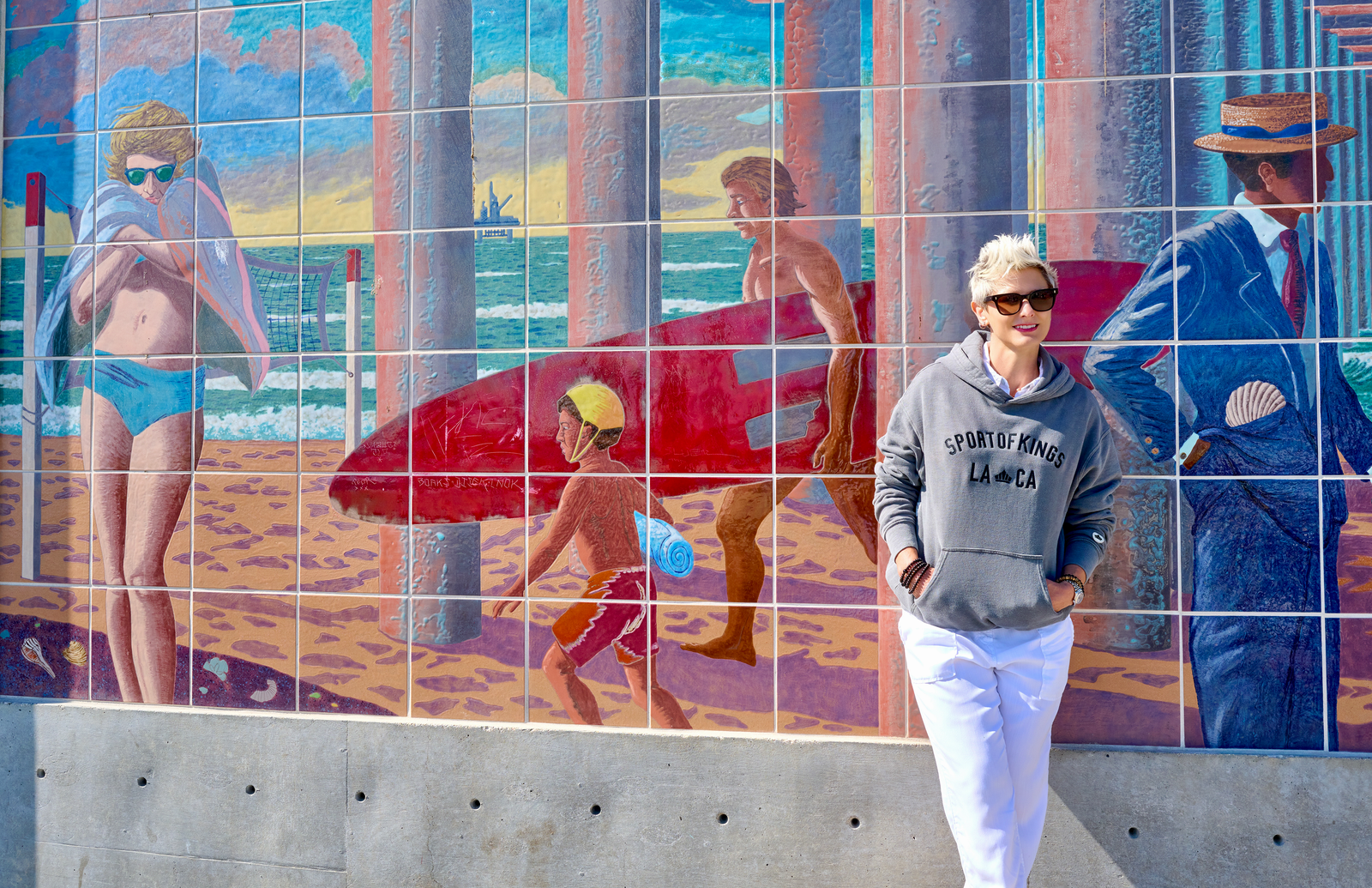Creating a business, let alone running a successful one, is not for the faint of heart. Dayna Lee Cornelius, CEO and Co-owner of streetwear brand SPORTOFKINGS, attributes her success in the retail industry to persistence, drive, and care.
For over three decades, Dayna has seen the fashion landscape evolve from home-grown brands to a global scale. Throughout her career, she has helped brands move through the constant changes in the market and grow their business through genuine connections, her manufacturing and production prowess, and a life-long pursuit for growth and success.
“I care about their business and the individuals that run them. They’re putting their brand in my hands. I’m responsible for helping them succeed, and I’m going to do everything in my power to make sure that that happens,” she shares.
From her first job in customer service in the 90s to working her way up to Global Sales Representative at an international manufacturing company to founder and CEO of her own brands, Dayna is an example of how far grit, resilience, and an insatiable appetite for knowledge takes you. She continues to carry this indefatigable drive with her at SPORTOFKINGS.
Joining the California-based company in 2020 at the start of the COVID-19 pandemic was challenging. Dayna, Ziggy Williams (co-founder and -owner), and the team had just suffered the loss of the brand’s co-founder Casey Wheat, but her love for Casey, the brand, and what it stands for fuels her passion.
“I was determined to do what Casey brought me here to do and help him realize his dream. Combining his capabilities, network, and vision for the brand with my experience and an understanding of what was needed, I knew we could build this into something very special.”
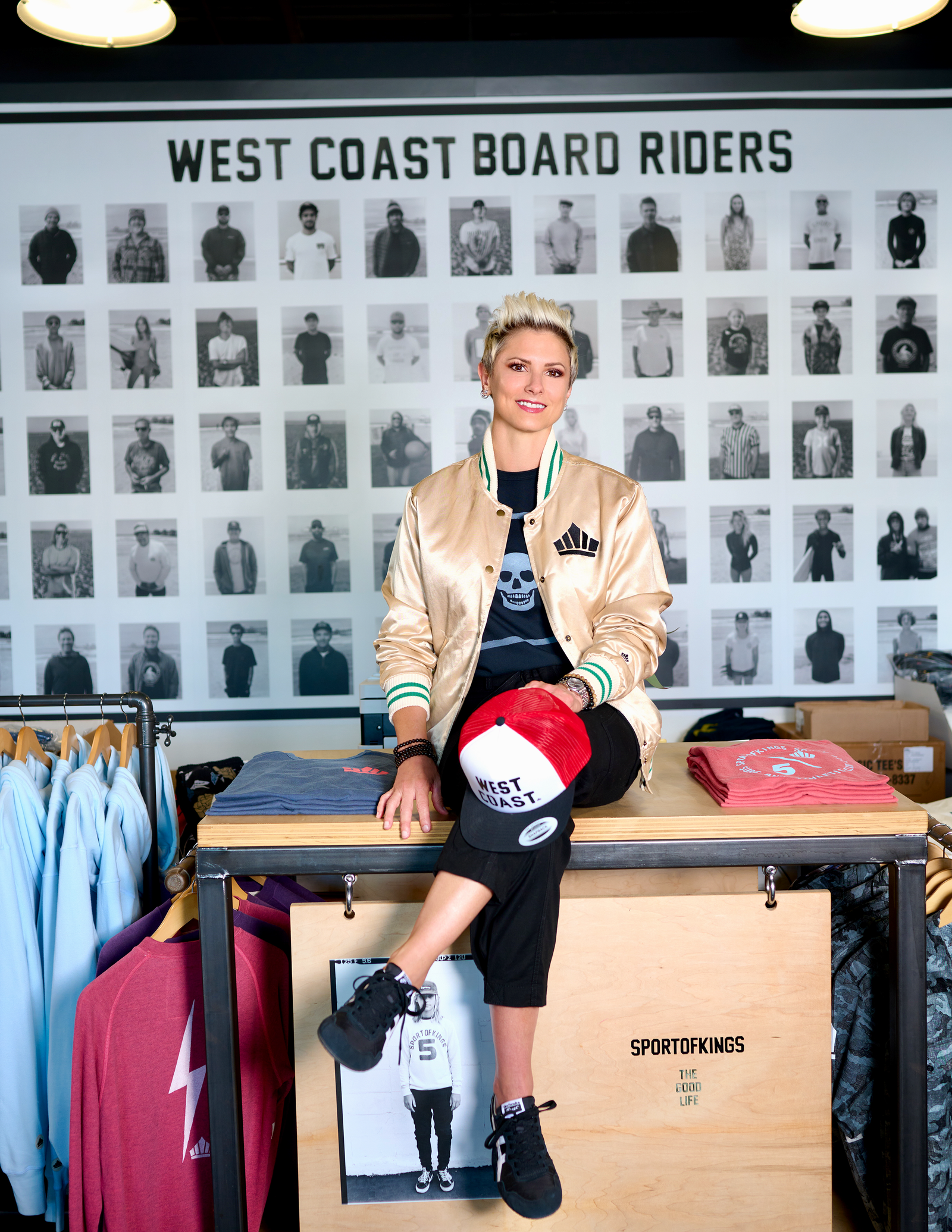
We sat down with Dayna to talk about advancing in her career, the future of the industry, and SPORTOFKINGS.
How did you get your start in the industry?
I grew up in Dallas, Texas, and I wasn’t in tune with the fashion industry, but I was exposed to the business when I moved to California in 1990.
I started in customer service for a clothing company many years ago. I loved learning how garments were constructed, the sketches, patterns, sewing, trims, and even how a t-shirt came to fruition. My love for that side helped fuel the business side of it for me. I grew more and more knowledgeable over the years and was lucky enough to work with people who wanted me to learn and do well.
After being with my first industry job for a couple of years, I moved on to another brand called Shore Break. They were a licensee and manufactured for Maui and Sons, Levi’s, and Bum Equipment. I worked with them for a few years and then moved on again.
By then, I’d been in San Diego for about 11 years, and I kept getting recruited to larger companies. I started putting feelers out and making friends in the industry. I was learning higher-level things from these companies, and it helped me excel in my career. I began understanding textile manufacturing, factory operations, costing variations, net margins, and how to be profitable whether you’re doing wholesale, retail, or DTC.
I took the knowledge and moved on to managerial positions focused on a scale where we would take them from 1-10 million to 50–60-million-dollar operations.
One thing led to another, and before I knew it, I’ve been doing it for 30 years. I can’t imagine doing anything else.
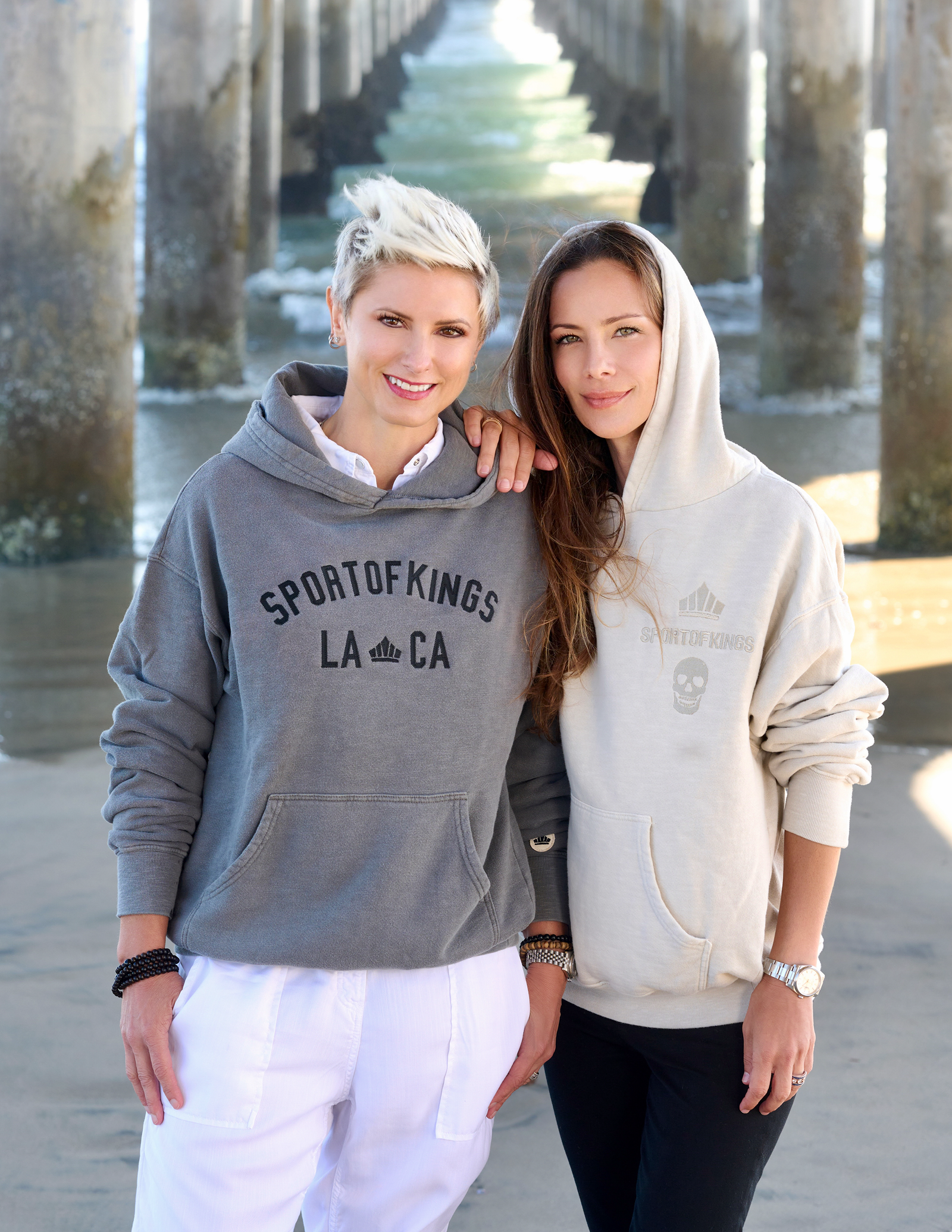
And when did the idea of connecting brands to overseas manufacturers come about?
I was very entrepreneurial early on. I founded my first company in 1997, where I manufactured and produced garments for other people. I was recruited to handle overseas and international production for No Fear, a company in Carlsbad, California, and that led me to a different career path.
A vendor I contracted to manufacture clothing out of Pakistan, 6ix Sigma Apparel Group recruited me. I became their agent for international sales for brands here in the States, including Quicksilver, DC Shoes, Urban Outfitters, and other companies. I worked with the designers and production departments to acquire their business and manufacture their products overseas in Pakistan.
We generated a large amount of business with a number of brands. When I started working with the company, they were doing 5 million dollars in revenue, and throughout the 15 years I was with them we grew it to be over a hundred million dollars a year.
What made you decide to start your own business instead of working for other brands or other companies?
I knew that once I learned how to do what the owners and my mentors were doing, there was no reason not to do it for myself. If you’re going to make money in this world, if you want to be a boss, a real boss, you have to be willing to take risks and deal with the uncertainty and discomfort that comes along with it. It’s hard work but you reap the rewards of that work.
It’s either you make money for somebody else, or you make money for yourself doing the same job. It just made sense to try and do it for myself.
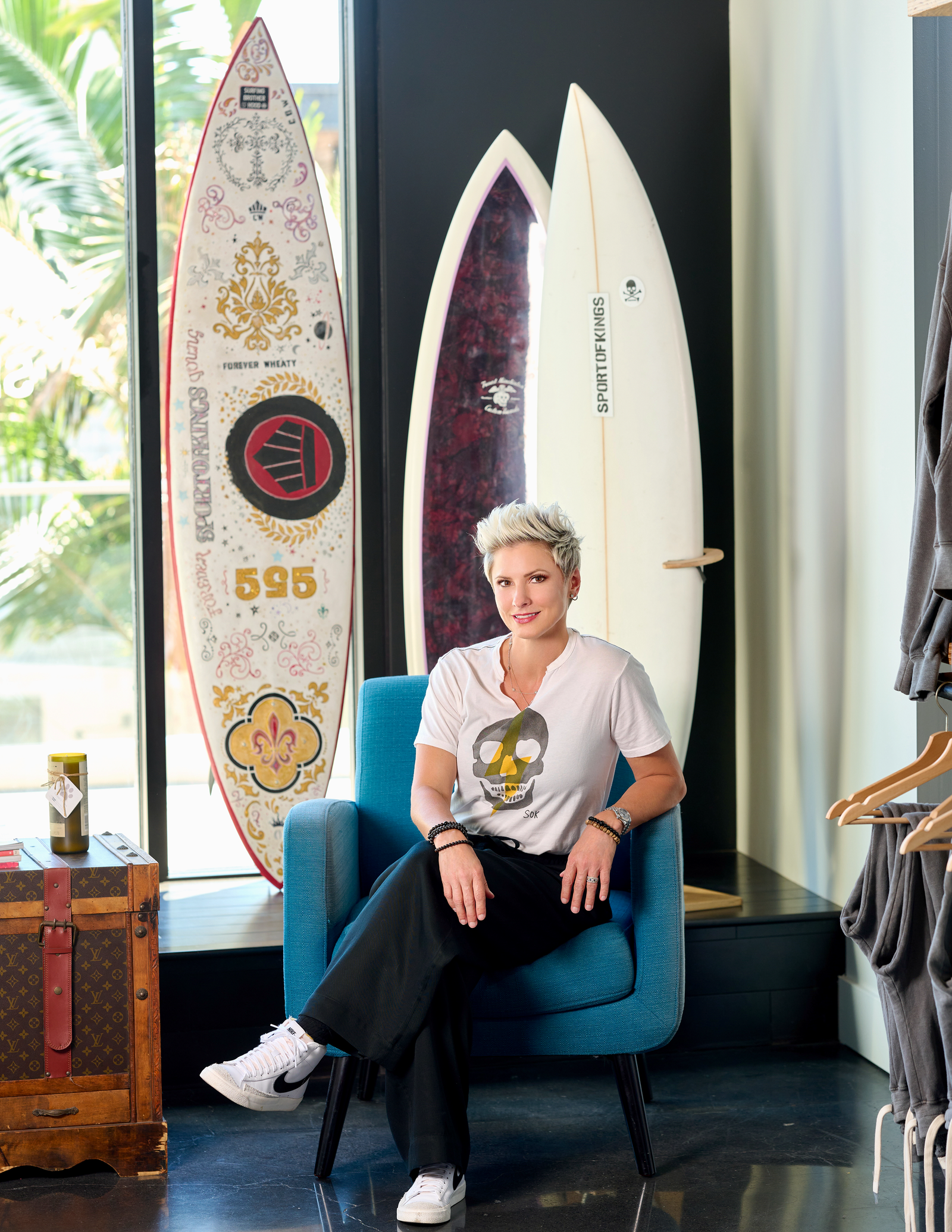
Was starting a business scary for you?
There’s no way you won’t experience nervousness or feel a little bit scared of certain things throughout your life. Every person that owns a company feels a bit of fear at times.
You must keep exploring, learning, and making sure you’re doing all the right things to make your business successful. You can’t assume you know it all. Everything changes, from your phones, how you network with people, and the connections that you make. Even with how we manufacture our products today, machines are getting better, faster, and smarter.
You have to understand that what you’re doing at the time is going to change. To be truly successful, you need to adapt to the ever-changing world as it keeps on moving. I learn something new all the time and I will never say that I know everything. I will always seek to continually improve, ask questions, and never think that there’s nothing left for me to learn.
Are there any key learnings you picked up through the years that helped shape your career?
I’m very fortunate and grateful for the experiences that I’ve had over the years. The most transformative years of my life and career happened with 6ix Sigma Apparel Group. I learned how to navigate international business and truly grasp operations, manufacturing, and dealing with different cultures. I’ve traveled all over the world working with different people and brands and it influenced me greatly.
I was regularly in very large factories that manufactured for some of the biggest brands in the world and learned to grasp some pretty complex issues. I learned from the engineers who worked the machines. I learned how to audit and ensure that these factories are up to code and doing everything ethically and socially responsible for their employees.
I also learned how to be comfortable opening up. I was quite shy and very much an observer. I would sit back and listen and learn. I understood manufacturing from my experience, and it made it easy for me to go out and speak with the production and design teams at Quicksilver or Abercrombie & Fitch, Hollister, and companies in New York because I knew how to make the best products for their designs. That made it easier for me to obtain business because I understood their side, and in fact, was an unusual sales executive in that I didn’t start the meeting by listing the litany of things I could do for them but instead asked how I could help them. I also understood the factories and operational side of it too. I married those two things and made it a win-win situation for everybody.
I cared about their business and the individuals that run them. They’re putting their brand in my hands. I’m responsible for helping them succeed and I’m going to do everything in my power to make sure that that happens. That’s just who I am at the core. I work with people that I like and care for. I don’t work with every single brand that comes to me. I have to feel a connection and be inspired. I believe that every brand that I ever worked with would tell you that.
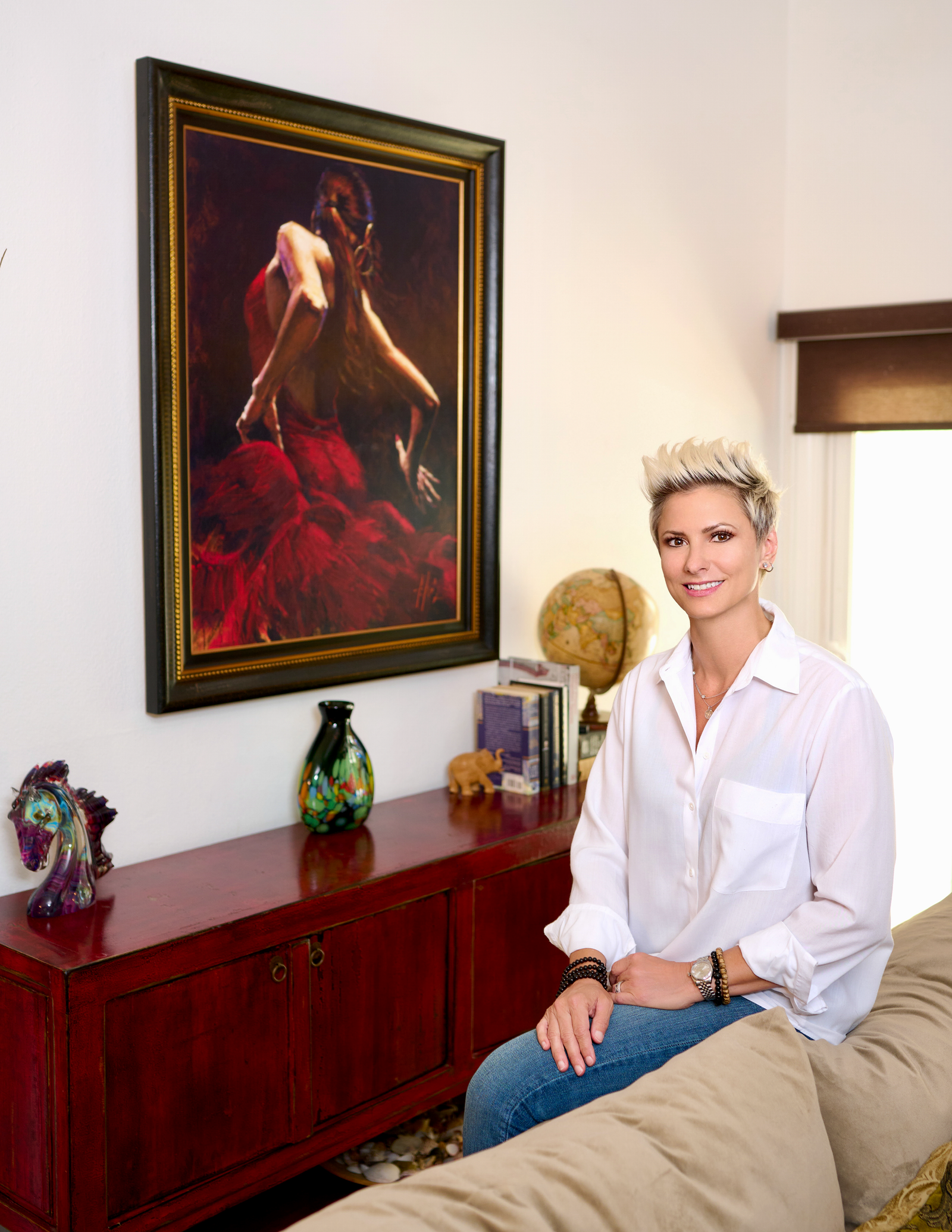
Having been in the industry for over three decades, you must have seen it grow and transition through its phases. How different is it now from how it was when you started?
The most significant change is that many of the factories we used to work with in Los Angeles have shut down because companies moved production offshore because the pricing was so cost-effective. It’s so much less to manufacture overseas versus what it costs us here in the states.
Everything is also much faster and quicker now. Fashion is quicker. It used to take a long time for trends to catch up from even the West coast to the East coast. Now everything is instant. People all over the world are wearing the same things. It’s just crazy how fast everything moves.
That’s an interesting observation. What do you think brought that shift from manufacturing locally in the States to overseas?
It was becoming too expensive here, especially when mass market retailers began taking over. That was the biggest shift because people started to manufacture in massive quantities at such a cheap price. It became very difficult for your average brands and retailers to compete with that. They had no choice but to move their production overseas if they wanted to stay in business. It was just more cost-effective than manufacturing here. You can either manufacture overseas and hire more employees in the US to run your actual business or you can manufacture domestically and have a smaller team that can handicap growth.
There’s been a resurgence of brands growing and manufacturing locally too, right?
Even before the pandemic, people were starting to realize how much of our goods are coming from overseas. I think this prompted a lot of brands to manufacture at least a portion of their goods in Los Angeles. Trying to bring back some local businesses has become a movement.
It can be hard to navigate, especially with how expensive it is to manufacture in California, but I do think that it’s something that will continue to get stronger over the next couple of years. I think this is highlighted by the importation backlogs during the pandemic. The supply chain shortage brought to light how dependent we are on other countries to bring in products for our everyday use.
SPORTOFKINGS was so fortunate because we did everything here. We keep 95% of our production local, within 50 miles of our office in Huntington Beach. Customers love that our products are homegrown and homemade and we are proud to support local factories throughout Orange County and the Los Angeles area. That allowed us to grow through that unsettling time because we had the products that we needed while so many other brands didn’t have their merchandise.
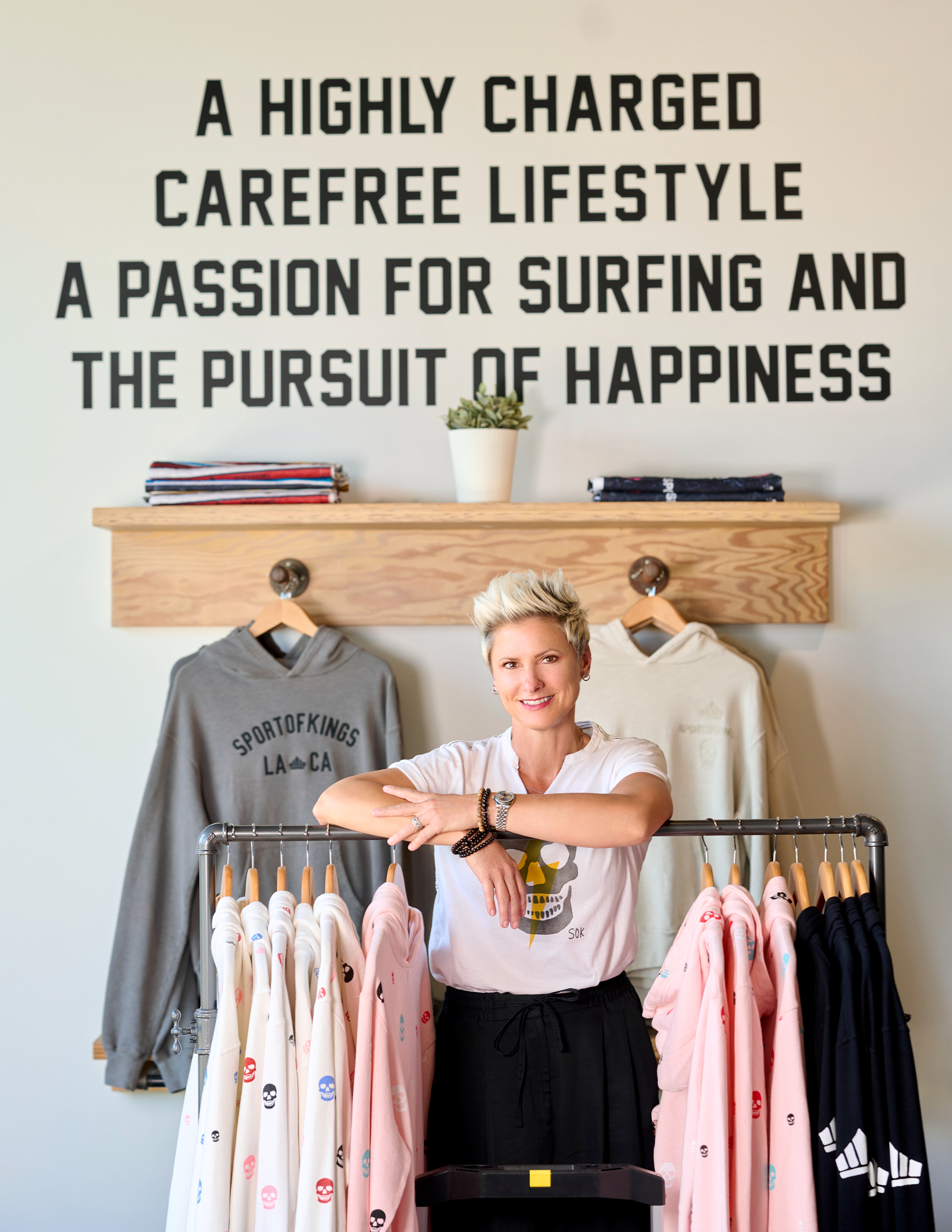
What do you think makes a great brand successful?
I believe it’s how that brand makes someone feel about themselves when they wear it. Everyone has something to say and a statement to make when they put on a piece of clothing.
If your brand helps that person identify with who they are and makes them feel good about themselves then you’ll succeed. Whether it’s an active brand that’s about a health movement or you’re a brand that’s about making someone feel beautiful, all those things come into play.
You have to grab onto that emotional pull and what makes them want to wear your products. People buy things because of how it makes them feel.
And what statement is SPORTOFKINGS making as a brand?
I think we allow people to get in touch with that rebel inside themselves. We’re a little rough around the edges but also premium, so the clothing is nice and comfortable. We are an athleisure brand that focuses on quality over quantity.
It’s about the people that say, ‘I do what I want.’ We all have this personality inside us that wants to color outside the lines a bit. That’s what SPORTOFKINGS does. We allow people to wear clothes that make them feel cool and break from the social norm.
What was it like joining SPORTOFKINGS leadership during the pandemic?
It was very difficult for many reasons. We lost one of the founders and main face of the company when Casey Wheat passed away. Everyone was kind of lost for a bit and there was a lot of uncertainty during the pandemic.
But The thing is though, I woke up every day thinking about SPORTOFKINGS. The work they were doing, the vibe that it had, and why people were gravitating towards the brand. It’s a very cool brand with a California lifestyle in mind.
Regardless of the pandemic or losing Casey, I knew that we could take the brand far if we held on to the foundation that was already built and the authenticity that it had.
I had known Casey for years before I worked with him because he was a family friend of my wife’s. He was such a dynamic personality and a beautiful human that I already loved him and the brand; that’s what drew me in initially.
I took ownership of the brand and put my heart and soul into it to ensure that it would succeed. It can be difficult to navigate a company when it’s not your initial idea because you’re trying to tread lightly and figure out how best to do it without stepping on toes. I was determined to do what Casey wanted me to do though. Combining his design capabilities, network, and vision, with my experience I knew that we could build this to be very special.
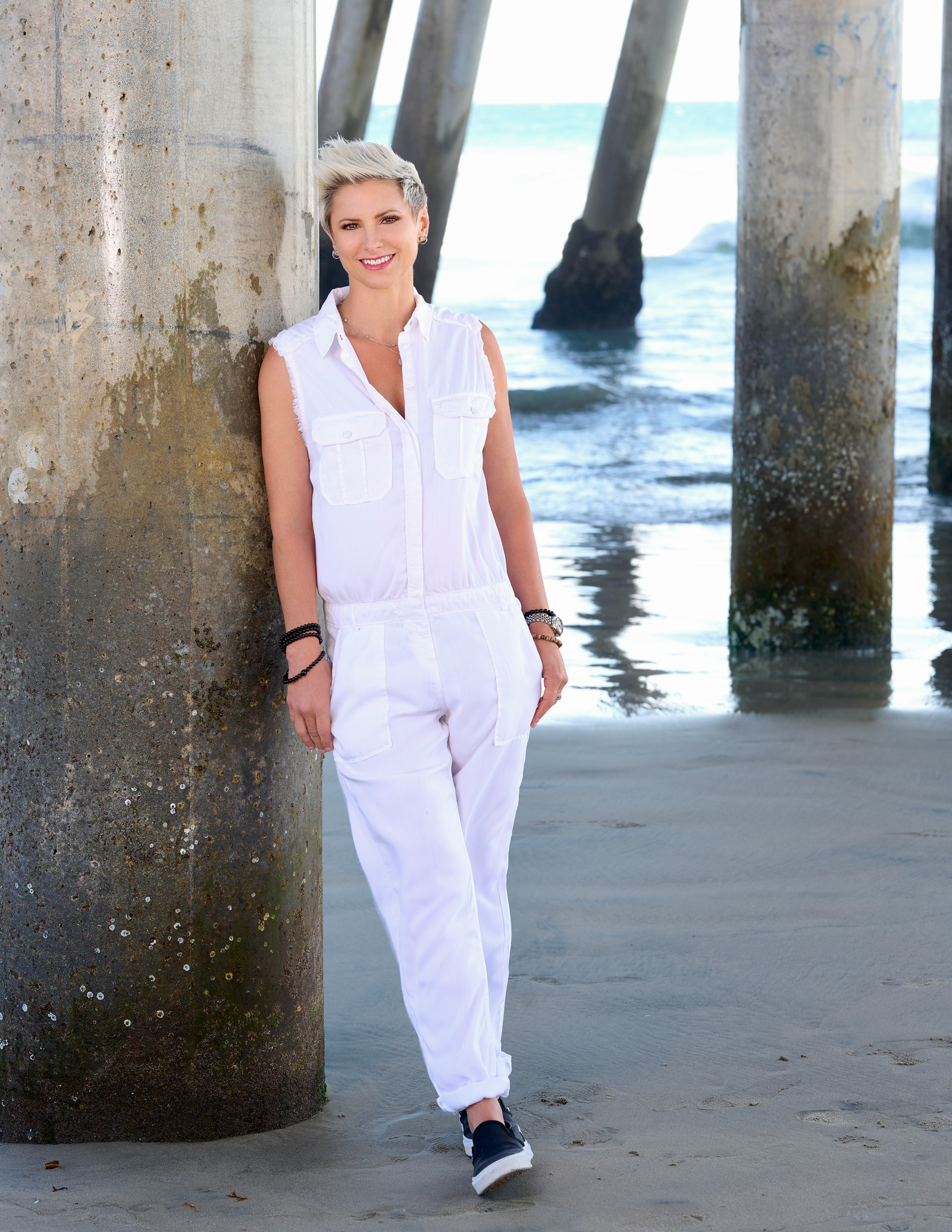
Where do you see the brand going? Are there future projects that you’re excited about?
We do plan on opening more flagship stores. The plan is that we open a flagship in prime areas. We’ll have one in New York, Texas, and another one somewhere in Los Angeles. We also have our flagship store in Huntington Beach. The idea is to have these stores be an experience and we can create somewhat of a “bespoke” space where people can customize their own version of SPORTOFKINGS pieces.
And where do you see the whole retail and manufacturing landscape heading? Is there something that the industry should be addressing?
The biggest thing that we all want to do is be more eco-friendly. It’s very clear that our planet is suffering, and fashion is part of the issue. We have to make sure that we’re responsibly sourcing yarns that are going into the products by removing plastics that we’re using. We need to be utilizing alternative fabrics instead of constantly pumping out polyester into the world. These are things that our planet needs.

